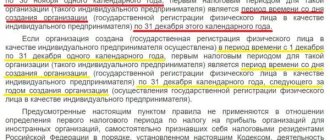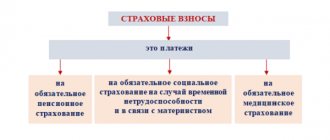Home — Articles
Commentary to the Letter of the Ministry of Finance of Russia dated May 14, 2012 N 03-03-06/1/247 “On the procedure for accounting for direct and indirect expenses for profit tax purposes”
For tax accounting purposes, as is known, production and sales costs should be divided into direct and indirect. The issue of classification of expenses is not idle; it is fundamentally important and can significantly affect the size of the tax base. After all, according to paragraph 2 of Art. 318 of the Tax Code of the Russian Federation, direct expenses relate to expenses of the current reporting (tax) period only as products, works, services are sold , the cost of which they are taken into account in accordance with Art. 319 of the Tax Code of the Russian Federation. Therefore, for example, if a taxpayer has large balances of unsold products, direct expenses actually “settle” in it and cannot be recognized as a reduction in the tax base for income tax until these products are sold. It is not surprising that from time to time taxpayers ask questions about how to properly classify expenses in a given situation. The financiers voiced their opinion on one of these situations in the commented Letter dated May 14, 2012 N 03-03-06/1/247.
Who distributes the costs
It is not always necessary to distribute expenses into direct and indirect. The diagram will help you understand in which case this needs to be done:
As you can see, non-trading organizations in which income and expenses are determined on a cash basis do not need to divide expenses into direct and indirect. The same applies to those who use simplified or imputation instead of the general regime, as well as entrepreneurs. The latter, even if they are in the general regime, do not pay income tax.
All this follows from the provisions of Articles 272, 318 and 320 of the Tax Code of the Russian Federation.
Get access to a demo version of ilex for 7 days
Please note that in order to recognize an expense, all the above conditions must be met. If at least one of the conditions is not met, then the organization’s accounting records recognize not an expense, but a receivable.
Paragraph 17 of PBU 10/99 establishes that expenses are subject to recognition in accounting, regardless of the intention to receive revenue, operating or other income and the form of the expense (cash, in kind and other).
Which expenses are indirect and which are direct? What expenses are included in BP, NU and PR and in what accounting accounts?
The decision about the impossibility of classifying a particular expense as direct (and, accordingly, recognizing it as indirect) must be made in each specific case, taking into account economically sound indicators and features of the technological process.
Composition of direct and indirect costs
The composition of direct and indirect costs differs for manufacturing and trading organizations.
Production of goods, works or services
You have the right to determine yourself which costs in the production of goods, works or services are classified as direct and which as indirect. The list of expenses is approved by the head of the organization and recorded in the accounting policy.
When making your choice, be guided by the following principles. As part of direct expenses, reflect those costs that are directly related to production or sales. In this case, you can focus on industry specifics and proceed from the specific features of the production process in the organization itself.
Typically, direct production costs include:
- material costs. In particular, the costs of purchasing raw materials and materials that will be used directly in production, as well as components undergoing installation, and semi-finished products that require additional processing;
- expenses for remuneration of employees engaged in production activities and social insurance contributions accrued from these amounts. The same applies to contributions for insurance against accidents and occupational diseases;
- depreciation of fixed assets that are used in the production of goods, works or services.
This follows from paragraph 1 of Article 318 of the Tax Code of the Russian Federation.
The remaining costs that are not directly related to production or, according to technical regulations, are not included in it, are classified as indirect. In addition to non-operating expenses, they are considered separately.
At the same time, recognize as indirect only those expenses that cannot be classified as direct for objective reasons. For example, the costs of raw materials and supplies, which are included in the cost of a unit of production, can only be classified as direct.
All this follows from Article 318 of the Tax Code of the Russian Federation. This is confirmed by letters from the departments - the Ministry of Finance of Russia dated February 7, 2011 No. 03-03-06/1/79 and the Federal Tax Service of Russia dated February 24, 2011 No. KE-4-3 / [email protected] A similar position is expressed in the definition of the Supreme Arbitration Court RF dated May 13, 2010 No. VAS-5306/10 and resolution of the Federal Antimonopoly Service of the Ural District dated February 25, 2010 No. F09-799/10-S3.
Trade
For trade organizations, the list of direct expenses is fixed. It is given in Article 320 of the Tax Code of the Russian Federation. Direct costs include:
- purchase price of goods. How to calculate it, organizations have the right to determine independently. For example, you can include expenses that are associated with the purchase of goods. These are, in particular, expenses for packaging, warehouse and other costs paid by another organization. Fix the selected option in your accounting policy for tax purposes;
- costs of delivering goods to the buyer's warehouse (when they are considered separately from the cost of the goods themselves).
All other expenses (except for non-operating expenses provided for in Article 265 of the Tax Code of the Russian Federation) are considered indirect and reduce income from sales of the current month.
This procedure is provided for in Article 320 of the Tax Code of the Russian Federation.
Situation: can the costs of delivering goods from the supplier to your warehouse using your own transport be considered direct expenses when calculating income tax? The organization is engaged in trade.
Yes, you can.
The cost of delivering goods to the buyer’s warehouse should be included in direct costs by a trading organization. However, no separate conditions or restrictions have been established. This means that it does not matter whether the buyer pays for delivery to a third party or transports the goods on his own.
But the costs of maintaining your own vehicles used for transporting goods should be classified as indirect costs. They are not directly related to the purchase of goods. This follows from the provisions of Article 320 of the Tax Code of the Russian Federation. A similar opinion is expressed in the letter of the Ministry of Finance of Russia dated January 13, 2005 No. 03-03-01-04.
Situation: can a trade organization include as direct expenses when calculating income tax the costs of delivering goods that it ships to customers directly from manufacturers' warehouses? The organization is engaged in trade.
No, he can not.
Direct costs include the costs of delivering purchased goods (transportation costs) only to the organization’s warehouse, if they are not included in the purchase price. Since during transit trade the goods are shipped directly to the buyer, bypassing their own warehouse, the specified conditions are not met. Therefore, such transport costs should be considered as expenses associated not with the acquisition, but with the sale of goods.
Costs associated with the transportation of goods sold are indirect. At the same time, they reduce income from the sale of these particular goods. This procedure follows from the provisions of Article 286 and paragraph 3 of Article 320 of the Tax Code of the Russian Federation.
Non-operating expenses (page 1 of 3)
In addition, the state duty has increased: - for issuing permits for the attraction and use of foreign workers - from 6,000 to 10,000 rubles. for each foreigner (clause 23 p.
To recognize expenses for both accounting and tax purposes, certain conditions must be met.
Questions about filling out the income tax return for 2021 and profit taxation for 2021 are explained by Victoria Dyavgo, head of the direct taxation department of the Internal Revenue Service for the city.
Documented expenses mean expenses supported by documents drawn up in accordance with the legislation of the Russian Federation. Any expenses are recognized as expenses, provided that they are incurred to carry out activities aimed at generating income.
For example, the amounts of fines, penalties, and other sanctions for violation of contractual and debt obligations are recognized either on the date of recognition of the debt by the debtor, or on the date of entry into force of the court decision (). Other non-operating expenses are also justified expenses of the organization that are not related to production and sales, but are not directly named in. For example, other non-operating expenses include expenses in the form of:
- the amount of the arbitration fee paid in accordance with the rules of the permanent arbitration court (), etc.
- premiums and discounts provided under the service agreement (, );
However, it cannot be said that non-operating and other expenses in each case will be the same according to the list of items.
The organization's accounting records the buyer's receivables for the goods supplied to him, as well as the debt for the penalty recognized by the debtor for late payment for the goods, which was previously included in non-operating income. However, both of these subcategories are not non-sales; they are directly related to the expenditure of funds aimed at the production or sale of goods. The required division has nothing to do with Article No. 265 of interest to us, and is carried out in accordance with another part of the Tax Code - Article No. 318.
When to recognize expenses
Write off indirect expenses in full in the period to which they relate. That is, according to the rules of Article 272 of the Tax Code of the Russian Federation.
But direct costs will have to be distributed. That part of them that relates to the balances of work in progress or unsold goods cannot be recognized as current expenses. This can only be done as goods and works are sold, the cost of which includes such expenses.
This is stated in paragraph 2 of Article 318 of the Tax Code of the Russian Federation.
Direct costs do not need to be distributed between the costs of the current tax (reporting) period and the cost of services not accepted by customers at the end of this period. The reason is that a service for tax purposes is recognized as an activity whose results do not have material expression. Services are sold and consumed in the process of their provision. In this regard, there is no need to distribute all costs incurred, both direct and indirect, among services. You have the right to recognize them in the current period. This procedure for accounting for direct costs must be fixed in the accounting policy.
This follows from paragraph 5 of Article 38, Article 313 and paragraph 3 of paragraph 2 of Article 318 of the Tax Code of the Russian Federation, letter of the Ministry of Finance of Russia dated June 15, 2011 No. 03-03-06/1/348.
Do all service costs need to be written off at once?
Article 318 of the Tax Code of the Russian Federation allows for the possibility of writing off direct expenses when providing services by analogy with indirect ones.
See also “When services are provided, direct costs are not allocated to refinery balances .
However, this possibility should be approached with some caution. If the services provided do not require preliminary preparation and, at the junction of tax periods, the occurrence of situations where there are already costs for them, but have not yet been realized, is excluded or extremely rare, then such a write-off of expenses is justified. If it is possible to regularly generate work in progress for services and its amounts can be significant, then in order to avoid significant discrepancies between accounting and tax accounting, it is better to write off the expenses collected in account 20 for services in the usual manner for direct expenses with reference to the fact of sale.
Find out how recent judicial practice is developing on the application of Art. 318 of the Tax Code of the Russian Federation, available from the analytical selection from ConsultantPlus. If you don't have access to the system, get a free trial online.
Expenses when there is no income
Situation: how to take into account direct and indirect expenses when calculating income tax using the accrual method if there is no income from sales in the reporting period. Is the organization not a newly created one?
If there is no income in the reporting period, the organization can only recognize indirect expenses.
The explanation is simple - you can recognize direct expenses only as goods, works or services are sold, the cost of which includes the costs. Direct expenses that relate to the balance of unsold products cannot be taken into account when calculating income tax.
As for indirect expenses, they are in no way tied to the revenue received. They can be taken into account in the current period. And expenses in tax accounting are recognized only as expenses that meet the following criteria:
- are aimed at generating income and are economically justified;
- documented.
These are the requirements of paragraph 1 of Article 252 of the Tax Code of the Russian Federation.
Moreover, if a specific expense does not bring direct income to the organization, this does not mean that it is unreasonable. It is enough that it is necessary for the activity that will result in the income generated. Therefore, indirect expenses of an organization can be recognized even in the case when income has not yet been received in the reporting period. Such conclusions are expressed in letters of the Ministry of Finance of Russia dated August 25, 2010 No. 03-03-06/1/565, dated May 21, 2010 No. 03-03-06/1/341, dated December 8, 2006 No. 03 -03-04/1/821.
What is more profitable for the organization?
Obviously, it is more profitable for taxpayers to recognize as many expenses as possible as indirect. This will allow you to write off related expenses faster and reduce your current tax liability.
The significance of this type of profit is its influence on the formation of the tax base. Non-operating income must be taken into account when calculating the following types of taxes:
- profit tax - types of profit are summed up both from the sale of goods, works, services (under Article 249 of the Tax Code of the Russian Federation), and non-sales turnover (under Article 250 of the Tax Code of the Russian Federation);
- determination of the tax base under the special regime of the simplified tax system (Article 346.16 of the Tax Code of the Russian Federation);
- taxable base for the tax regime of the Unified Agricultural Tax (Article 346.5 of the Tax Code of the Russian Federation).
From January 1, 2021, organizations received the right to include reserves for doubtful debts in non-operating expenses. The Ministry of Taxes and Taxes explained to organizations the issues of inventory of receivables and the rules for the formation of bad debts in tax accounting.
The organization purchases goods intended for sale from a Belarusian seller. According to the agreement, the cost of goods is paid in Belarusian rubles equivalent to the amount in foreign currency. The seller issued an invoice in foreign currency. Can the purchasing organization take it into account for profit tax purposes and include the cost of purchased goods in the costs of their sale?
for which the established limitation period has expired;
Such expenses are reflected on the date of reflection of the corresponding income from the rental of property (financial lease (leasing)), other paid or gratuitous use, taken into account in the manner determined by subclause 3.15 of clause 3 of Article 128 of this Code.
In the income tax report, non-operating expenses are reflected under separate lines in the second sheet of the declaration, which is subsequently submitted for verification to the Federal Tax Service.
The vast majority of income and expenses of any organization are associated with the sale of goods and/or services. However, activities and financial reporting are not limited to sales alone. There are very significant income and expense items associated with other business processes; they also need accounting.





